2023-2024学年八年级英语教学同步精美课件(人教版)Unit1 单元语法讲练
文档属性
| 名称 | 2023-2024学年八年级英语教学同步精美课件(人教版)Unit1 单元语法讲练 | 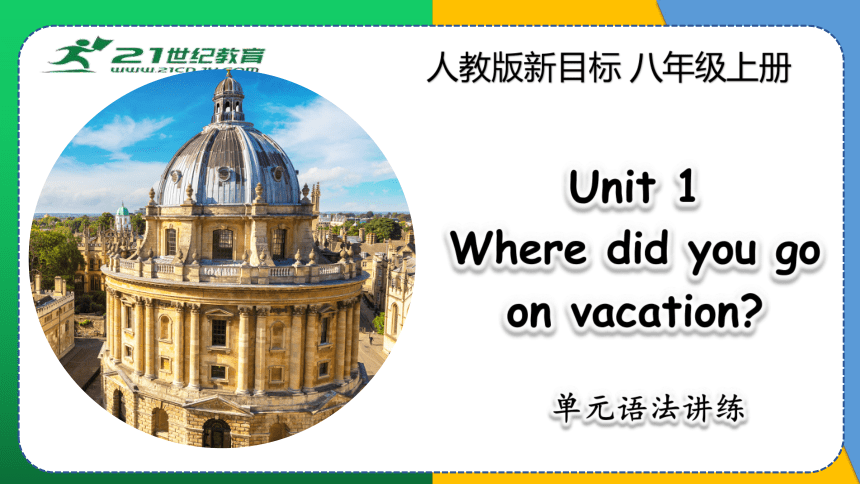 | |
| 格式 | zip | ||
| 文件大小 | 18.5MB | ||
| 资源类型 | 试卷 | ||
| 版本资源 | 人教新目标(Go for it)版 | ||
| 科目 | 英语 | ||
| 更新时间 | 2023-08-11 07:44:49 | ||
图片预览

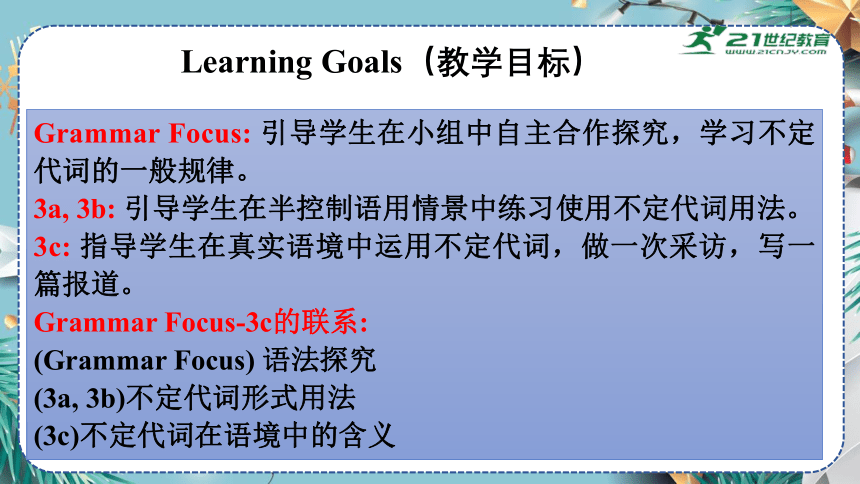
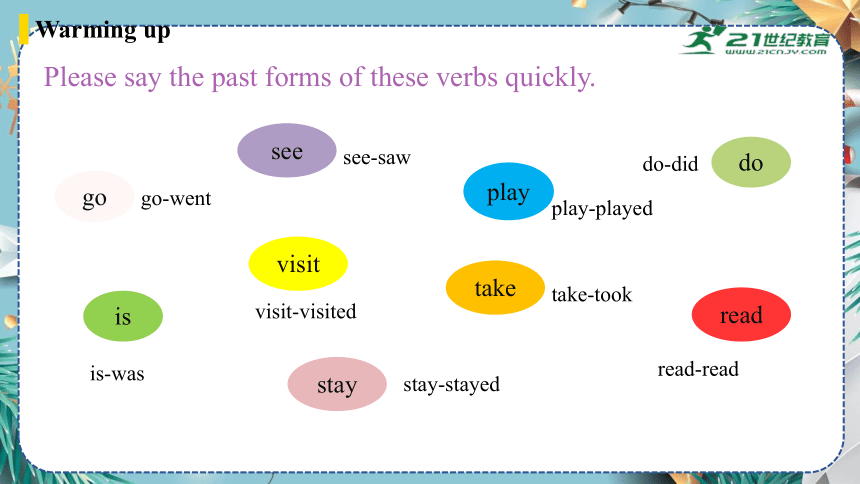
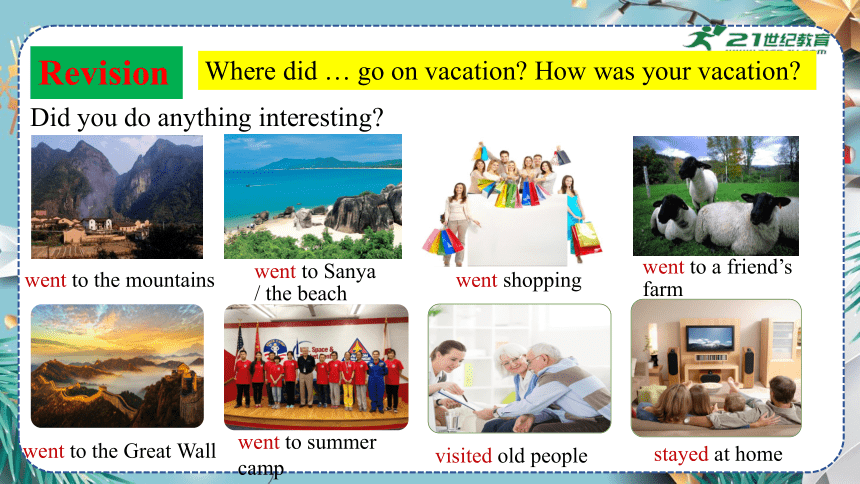

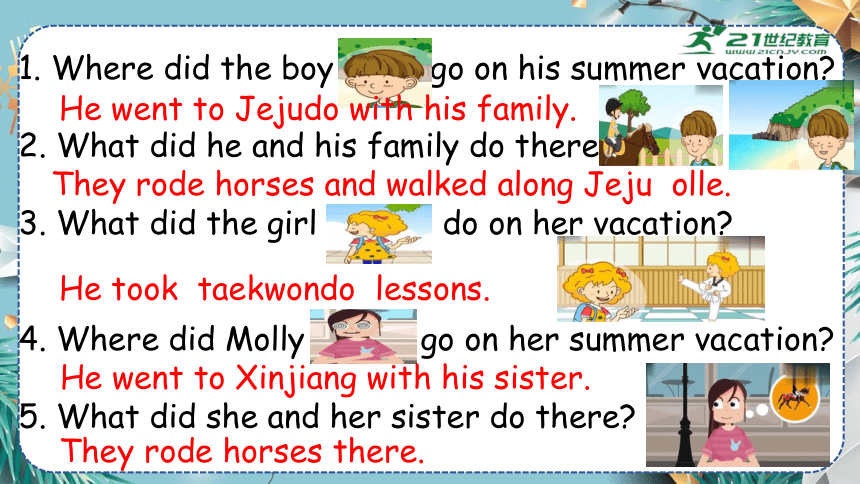
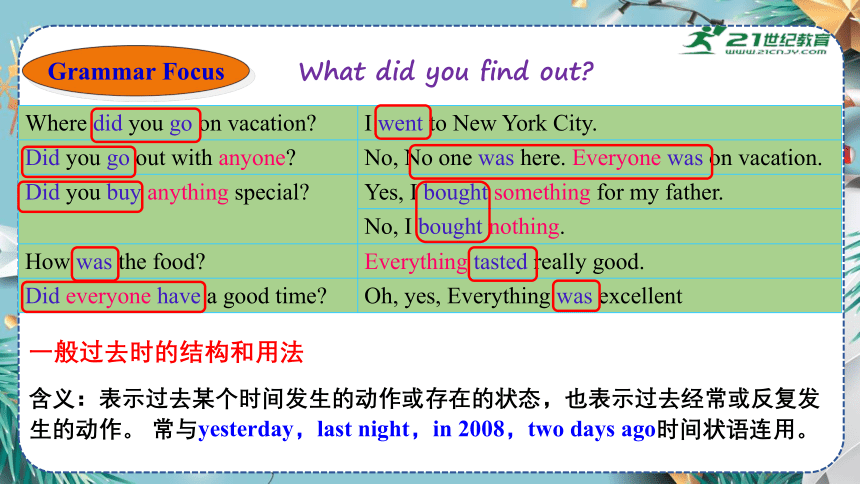
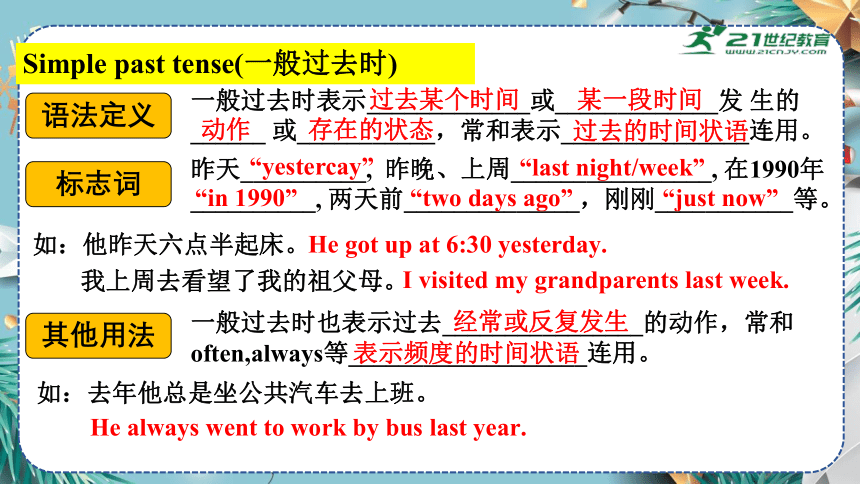
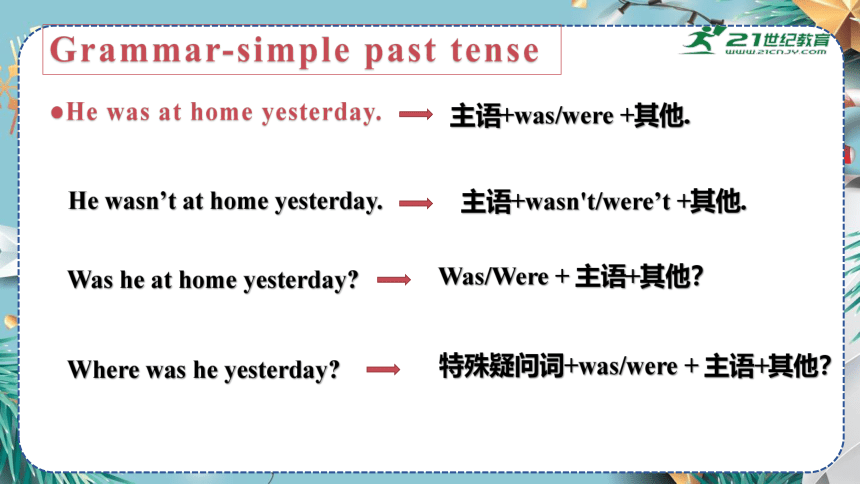
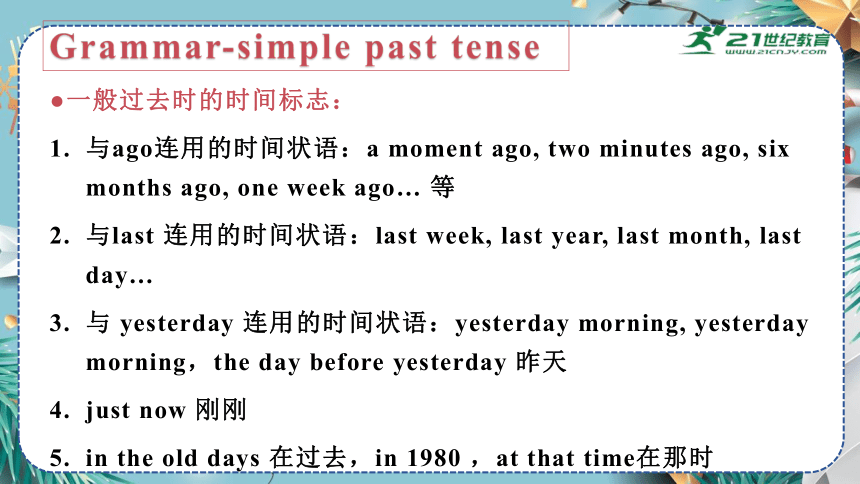
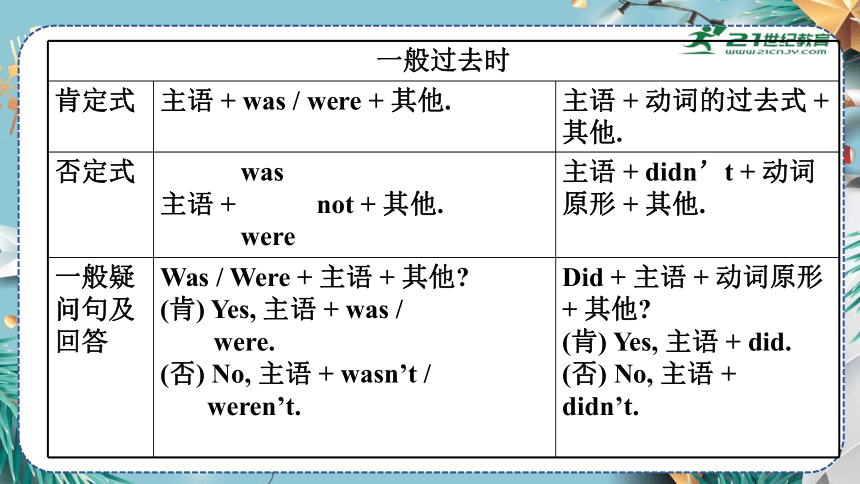
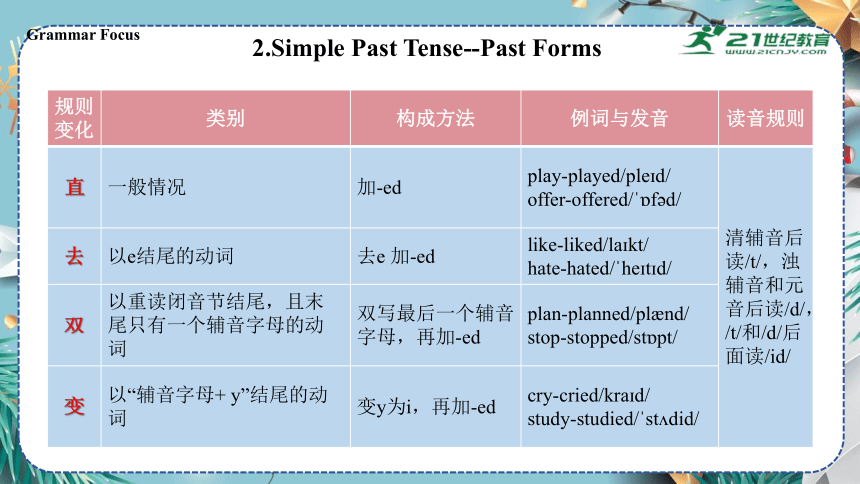
文档简介
(共50张PPT)
Unit 1
Where did you go on vacation
单元语法讲练
人教版新目标 八年级上册
Learning Goals(教学目标)
Grammar Focus: 引导学生在小组中自主合作探究,学习不定代词的一般规律。
3a, 3b: 引导学生在半控制语用情景中练习使用不定代词用法。
3c: 指导学生在真实语境中运用不定代词,做一次采访,写一篇报道。
Grammar Focus-3c的联系:
(Grammar Focus) 语法探究
(3a, 3b)不定代词形式用法
(3c)不定代词在语境中的含义
Warming up
Please say the past forms of these verbs quickly.
do-did
do
go
play
take
visit
stay
see
read
is
see-saw
go-went
is-was
visit-visited
take-took
play-played
stay-stayed
read-read
Revision
Where did … go on vacation How was your vacation
went to Sanya
/ the beach
went shopping
went to a friend’s farm
went to the Great Wall
went to summer
camp
visited old people
stayed at home
went to the mountains
Did you do anything interesting
动
Lead in
Enjoy a video and answer
动
1. Where did the boy go on his summer vacation
2. What did he and his family do there
3. What did the girl do on her vacation
4. Where did Molly go on her summer vacation
5. What did she and her sister do there
He went to Jejudo with his family.
They rode horses and walked along Jeju olle.
He took taekwondo lessons.
He went to Xinjiang with his sister.
They rode horses there.
Grammar Focus
Where did you go on vacation I went to New York City.
Did you go out with anyone No, No one was here. Everyone was on vacation.
Did you buy anything special Yes, I bought something for my father.
No, I bought nothing.
How was the food Everything tasted really good.
Did everyone have a good time Oh, yes, Everything was excellent
What did you find out
一般过去时的结构和用法
含义:表示过去某个时间发生的动作或存在的状态,也表示过去经常或反复发生的动作。 常与yesterday,last night,in 2008,two days ago时间状语连用。
Simple past tense(一般过去时)
语法定义
一般过去时表示_____________或_____________发 生的______ 或___________,常和表示_______________连用。
过去某个时间
某一段时间
存在的状态
动作
过去的时间状语
标志词
昨天__________, 昨晚、上周________________, 在1990年__________, 两天前______________,刚刚___________等。
“yestercay”
“last night/week”
“in 1990”
“two days ago”
“just now”
如:他昨天六点半起床。
He got up at 6:30 yesterday.
I visited my grandparents last week.
我上周去看望了我的祖父母。
其他用法
一般过去时也表示过去________________的动作,常和often,always等___________________连用。
经常或反复发生
表示频度的时间状语
如:去年他总是坐公共汽车去上班。
He always went to work by bus last year.
He was at home yesterday.
Grammar-simple past tense
He wasn’t at home yesterday.
Was he at home yesterday
Where was he yesterday
Was/Were + 主语+其他?
主语+was/were +其他.
主语+wasn't/were’t +其他.
特殊疑问词+was/were + 主语+其他?
一般过去时的时间标志:
与ago连用的时间状语:a moment ago, two minutes ago, six months ago, one week ago… 等
与last 连用的时间状语:last week, last year, last month, last day…
与 yesterday 连用的时间状语:yesterday morning, yesterday morning,the day before yesterday 昨天
just now 刚刚
in the old days 在过去,in 1980 ,at that time在那时
Grammar-simple past tense
一般过去时 肯定式 主语 + was / were + 其他. 主语 + 动词的过去式 + 其他.
否定式 was 主语 + not + 其他. were 主语 + didn’t + 动词原形 + 其他.
一般疑 问句及 回答 Was / Were + 主语 + 其他 (肯) Yes, 主语 + was / were. (否) No, 主语 + wasn’t / weren’t. Did + 主语 + 动词原形 + 其他
(肯) Yes, 主语 + did.
(否) No, 主语 +
didn’t.
2.Simple Past Tense--Past Forms
规则变化 类别 构成方法 例词与发音 读音规则
直 一般情况 加-ed play-played/ple d/ offer-offered/ f d/ 清辅音后读/t/,浊辅音和元音后读/d/,/t/和/d/后面读/id/
去 以e结尾的动词 去e 加-ed like-liked/la kt/ hate-hated/ he t d/ 双 以重读闭音节结尾,且末尾只有一个辅音字母的动词 双写最后一个辅音字母,再加-ed plan-planned/pl nd/ stop-stopped/st pt/ 变 以“辅音字母+ y”结尾的动词 变y为i,再加-ed cry-cried/kra d/ study-studied/ st did/ Grammar Focus
3 不规则动词过去式的构成(更多参见教科书)
类别 例词
过去式和原形一样
let → let cut → cut put → put
中间元音变化 i—a begin → began sing → sang swim → swam
ring → rang sit → sat give → gave
drink → drank
i—o drive → drove ride → rode write → wrote
o/a—e grow → grew know → knew
throw → threw draw → drew
类别 例词
过去式以ought和aught结尾 buy → bought think → thought
bring → brought catch →caught
teach → taught
结尾的d变为t build →built lend →lent
send →sent spend →spent
含有双写字母的词,将双写改为单写,在词尾加t keep → kept sleep → slept
sweep → swept feel → felt
含be动词的一般过去时的句式
肯定句:
否定句:
一般疑问句:
及其回答
特殊疑问句:
主语 + was/were + 其他.
主语 + was not( wasn’t)/were not( weren’t) + 其他.
Was/Were + 主语 + 其他
Yes, 主语 + was/were.
No, 主语 + wasn’t/weren’t.
特殊疑问词+was/were + 其他
There ______ a school concert last Friday. As you can see, there ______ many people and all of them ______ very happy. Unluckily, Amy ______ (be not)at the concert, because she ______ sick. Where ______ she She ______ in hospital. ______ there many pianos No, there _______.
was
were
were
wasn’t
was
was
was
Were
weren't
含do的一般过去时的句式
肯定句:
否定句:
一般疑问句:
及其回答
特殊疑问句:
主语 + 动词过去式 + 其他.
主语 + did not(didn’t) + 动词原形 + 其他.
Did +主语 + 动词原形 + 其他
Yes, 主语 + did.
No, 主语 + didn’t.
特殊疑问词 + did + 主语 + 动词原形 +其他.
Mike’s school trip ______ great. Where ______ she go She _______ (not go) to the zoo. She ______ (go) to a farm. On the farm, Carol ______ (milk) a cow and ______ (ride) a horse. ______ she feed chickens No, she ______. She only ______ (see) them.
In the afternoon, she ______ (take) some pictures of flowers. Then, she ______ (go) for a walk with her friends and ______ (talk) with a farmer.
was
did
didn’t go
went
milked
rode
didn’t
saw
took
went
talked
Did
动词一般过去时,表示过去发生的事;
be用was或用were, have, has变had;
谓语动词过去式,过去时间作标志;
一般动词加-ed,若是特殊得硬记。
否定句很简单,主语之后didn’t添;
疑问句也不难,did放在主语前;
如果谓语之前有did,谓语动词需还原;
动词若是was, were,否定就把not添。
易记歌谣
Last summer, I ______to the beach with my parents.
My vacation _____pretty good . I ____there by bus
_____my bus trip______ relaxing. The beach ______
very beautiful . It _______sunny. I _________ beach
volleyball and ______swimming. The people ______
friendly and the food was ________. I __________my
vacation very much and I _________to go there again.
went
was
went
and
was
was
was
were
delicious
enjoyed
hope
played
went
Write about your vacation and give a report.
Grammar Focus
探究语法规律
Where did you go on vacation I went to New York City.
Did you go out with anyone No, No one was here. Everyone was on vacation.
Did you buy anything special Yes, I bought something for my father.
No, I bought nothing.
How was the food Everything tasted really good.
Did everyone have a good time Oh, yes, Everything was excellent
What did you find out
1.定义:不指明代替任何特定名词或形容词的代词。
2.构成:由some、any、no、every 加上 -body, -one,-thing 构成的不定代词称为复合不定代词。
复合不定代词
some any no every
Person 人
Thing事
Place地点
Compound Indefinite Pronouns 复合不定代词
someone
anyone
no one
everyone
somebody
anybody
nobody
everybody
something
anything
nothing
everything
somewhere
anywhere
nowhere
everywhere
some构成的不定代词与any构成的不定代词的用法?
(1)形容词修饰不定代词时应后置。即: 不定代词+形容词(后置)
(2)不定代词作主语时,谓语动词要用三单形式。
Someone______waiting for you at door.
Everything _______(begin) to grow in sping.
_____everyone here today
Nobody/No one ______(know) his name
语法知识点1
There is ________ ________(一些毛病)with your ears.
Is there________ _________(一些有趣的)on TV tonight
I have _________ __________(一些重要的) to tell you.
Is there _______ ________ (其它的东西)in the box.
something wrong
anything interesting
something important
anything else
is
begins
Is
knows
肯定句
否定句
疑问句
(3)含有-some的不定代词一般用于____________中,
含有-any的不定代词一般用于________或________。
e.g. Is there ______________I can help you
我能帮你点什么吗?
e.g. There is ______________ interesting in the newspaper.
报纸里有一些有趣的东西。
e.g. I don’t want to see ____________________.
我不想看到任何人。
e.g. ____________________ is waiting for you now.
现在有人正等着你。
anything
something
anybody/anyone
Somebody/Someone
(4)特殊:
①在表示请求、建议、反问等的疑问句中,问话者希望得到肯定答复时,常用含有some的不定代词。
e.g. I am really hungry. Can I have something to eat
我真的很饿。我可以吃点什么吗?
② anyone/anybody,anything 也可用在肯定句中,
表示“任何人,任何事”。
e.g. Anyone/Anybody can finish it.
任何人都可以完成它。
e.g. You can do anything you want.
你可以做任何想做的事。
(5)含 -any 与 –no 不定代词/副词的用法转换
1. I don’t have anything to do.
=I have nothing to do. 我无事可做。
2. Alan didn’t eat anything last night.
=Alan eat nothing last night. 艾伦昨晚什么也没吃。
3. They don’t have anywhere to go.
=They have nowhere to go. 他们无处可去。
Presentation
anyone
something
anything
everything
nothing
Linda: Did you do _________ fun on your vacation, Alice
Alice: Yes, I did. I went to Sanya.
Linda: How did you like it
Alice: Well, it was my first time there, so_________ was really interesting.
Linda: Did you do with ________
Alice: Yes, I did. I went with my sister.
Alice: Of course! I bought __________ for my parents, but _________ for myself.
Linda: Why didn’t you buy _________ for yourself
Alice: I didn’t really see__________ I liked.
anything
everything
anyone
something
nothing
anything
anything
Linda: Did you go shopping
Fill in the blanks with the words in the box and practice the conversation.
Sure=当然
3a
3b
Fill in the blanks in the e-mail message with the words in the box.
anything, everything, nothing, everyone, no one
Dear Bill,
How was your vacation Did you do __________ interesting Did _________ in the family go with you I went to a friend’s farm in the countryside with my family. ___________ was great.
anything
everyone
Everything
3b
Fill in the blanks in the e-mail message with the words in the box.
anything, everything, nothing, everyone, no one
We fed some hens and saw some baby pigs. They were so cute! The only problem was that there was ________ much to do in the evening but read. Still ________ seemed to be bored. Bye for now!
Mark
nothing
no one
Presentation
Dear Bill,
How was your vacation Did you do anything interesting Did anyone in the family go with you I went to a friend’s farm in the countryside with my family. Everything was great. We fed some hens and saw some baby pigs. They were so cute! The only problem was that there was nothing much to do in the evening but read. Still no one seemed to be bored. Bye for now!
Mark
1. Where did Mark go on his vacation
2. How was his vacation
4. What was the problem
5. Did anyone seem bored
3. What animal did they feed
Read this e-mail again and answer the questions.
3b
...., but nothing for myself
myself → 我自己,我本人 → 反身代词 →一般用于动词或者介词后作宾语
反身代词:人称代词宾格/形容词性物主代词+-self
我自学英文。
I teach myself English. = I study English by myself.
丽莉放学后自己回家。
Lily goes home by herself after school.
myself yourself himself herself itself
我自己 你自己 他自己 她自己 它自己
ourselves yourselves themselves 我们自己 你们自己 他们自己 Language points
1. The only problem was that there was nothing much to do in the evening but read.
nothing much to do “没什么事可做”
今天下午我没什么特殊的事可做。
I have ________ _____ __ ____this afternoon.
没什么事可做,因此我就早早睡觉了。
There is _______ ______ __ ____,so I go to bed early.
nothing much to do
nothing much to do
The only problem was that there was nothing much to do in the evening but read.
noting much to do : 没有什么事情可做
but: ① 但是,表转折 ② 除了...之外
拓展:nothing…but…“除……之外什么也没有;
只有”。but后可接名词或动词原形。
我今天早上只喝了杯茶。
I had nothing but a cup of tea this morning.
我无事可做,只有看电视。
I had nothing to do but watch TV.
The only problem was that there was nothing much to do in the evening but read.
② 除了...之外
but前有实义动词do, does, did时,but后动词的to要省略掉;but前没有实义动词do, does, did时,but后的动词前要加上to
We had no choice but to go home.
She did nothing but cry all day.
I can do nothing but work hard.
Nobody is here but me.
前有do后无to
前无do后有to
Still no one seemed to be bored.
seem 好像; 似乎;看来
1、seem + n. /adj.“好像...”
Jenny seems a shy girl. You seem very happy.
2、seem + to do sth. “似乎要做某事”
You seems to like your new schoolbag.
3、It seems/ seemed+ that从句 “看起来像……”
It seems that he is unhappy.
4、seem like… “好像,似乎……”
It seems like a good plan.
拓展:
② seem + to do sth. “似乎要做某事”。
seem + n. “看起来……”。
例:他看起来是个好人。
He seems a nice person.
例:老师似乎同意我的观点。
The teacher seems to agree with me.
③ It seems/ seemed+ that从句 “看起来像……”。
例:看起来好像没有人相信你。
It seems that no one believes you.
④ seem like… “好像,似乎……”。
例:它好像是个好主意。
It seems like a good idea.
1.Yesterday Mom ________ me some money to buy a dictionary.
A. gives B. gave C. has given D. was giving
B
一般过去时
2. On January 29th, 2020, Zhong Nanshan and his team _____
over four hours online _____ five patients who were
seriously ill, and made a treatment plan for those patients.
A. spent; checking B. spent; to check
C. spend; checking D. spend; to check
A
3. Sally _______ where she had left the car and the police found it this morning.
A. forgot B. has forgotten C. forgets D. had forgotten
4. Eric often ______ his aunt before he moved to the city.
A. has visited B. visits C. visited
A
C
1.________ hopes for a sweet home as it provides us with warmth and trust.
A. None B. Everyone C. Nobody D. Somebody
(2020·江苏扬州中考)
2. —It’s unbelievable that 5G technology is progressing in such a rapid way!
—_______ is impossible.
A. Something B. Anything C. Nothing D. Everything
(2020湖北宜昌中考)
复合不定代词
B
C
3. — Have you asked _________ about the case
— No, except Bob.
A. everybody B. anybody C. nobody D. somebody
4. —Sally, I have _______ exciting to tell you. We will go back to school soon.
—Great!
A. anything B. something C. everything
A
B
Exercises
5
David is a tennis player. He to play tennis when he was six years old. (北京中考)
begins B. will begin C. began D. has begun
6
There six countries in SCO(上合组织) at first, but now the number has increased to eight. (东营中考)
is B. are C. were D. will be
C
C
Exercises
7
—Is there else in the classroom
—It’s empty. is listening to a speech in the school hall.
anyone; Anyone B. anyone; Everyone
C. everyone; Anyone D. everyone; Everyone
8
Please listen to the teacher carefully. She has important to tell us.
something B. everything
C. anything D. nothing
B
A
Ⅰ. 从方框中选择合适的词语填空,使每个句子在结构、句意和逻辑上正确。
1. There is _______ in the box. It is empty (空的).
2. ____________ is ready now for the party. Let's start.
3. —Is there __________ important in today's news
—No, there isn't.
4. —Would you like ___________ to eat, Emily
—Yes. Two cakes, please.
something, everything, anything, nothing
nothing
Everything
anything
something
someone, everyone, anyone, no one
5. —Did _______ call me when I was out, Alice
—Yes. Bob called you.
6. I'm very busy. I want _________ to help me with my work.
7. The game is very popular. __________ is interested in it.
8. —Who helped you clean the classroom yesterday
—_______. I did it all by myself.
anyone
someone
Everyone
No one
二. 用所给动词的适当形式填空。
We ______ (live) in Japan last year.
Jack________ (stop) the car last Sunday.
Tom _______ (clean) his room and ________ (study) for the Chinese test last weekend.
4.What ______ you ______(do) last night
5.On Sunday morning I _____ (play) tennis.
lived
stopped
cleaned
studied
did
do
played
三、句型转换
Lucy did her homework at home. (改否定句)
2. He found some meat in the fridge(冰箱).
(变一般疑问句)
3. She stayed there for a week.(对划线部分提问)
4. There was some orange in the cup.(变一般疑问句)
Lucy didn’t not her homework at home.
Did he find any meat in the fridge
How long does she stayed there
Was there any orange in the cup
四. 根据短文内容,用括号内所给词语的正确时态填空,使短文完整、通顺。
When I was young I lived in a village near the sea in Scotland (苏格兰). Life (1)_______(be) very different from now. It was the 1930s, so there was no TV, but my family had a radio, and we (2)__________(listen to) it every evening. My parents (3)__________(not have) a car, so I went to school by bicycle — 10 km every day!
was
listened to
didn't have
But I (4)___________(not study) very hard, and (5)_______(leave) school when I was fourteen. There were no cinemas near our village, so every Saturday I (6)_______(meet) my friends on the beach and we (7)_______(draw) pictures or letters in the sand all day. When I was fifteen, my parents (8)_______(sell) our house and the family (9)_______(move) to England. I never went back to my village, but I can still (10)_______(hear) the sea lapping (轻拍) on the beach.
didn't study
left
met
drew
sold
moved
hear
Homework:
Compulsory homework(必做作业)
1. 背诵并默写Section A Grammar Focus 中的句子。
2. 预习Section B1a-1d, 默写P4单词。
Optional homework (选做作业)
Write about your vacation
.
For example :Last summer I went to the beach . My vacation was great . I went there by bus and my bus trip was relaxing . The beach was very beautiful . It was sunny, cool and humid .the people were friendly and the food were delicious .I enjoyed my vacation very much and I hope to go there again .
Unit 1
Where did you go on vacation
单元语法讲练
人教版新目标 八年级上册
Learning Goals(教学目标)
Grammar Focus: 引导学生在小组中自主合作探究,学习不定代词的一般规律。
3a, 3b: 引导学生在半控制语用情景中练习使用不定代词用法。
3c: 指导学生在真实语境中运用不定代词,做一次采访,写一篇报道。
Grammar Focus-3c的联系:
(Grammar Focus) 语法探究
(3a, 3b)不定代词形式用法
(3c)不定代词在语境中的含义
Warming up
Please say the past forms of these verbs quickly.
do-did
do
go
play
take
visit
stay
see
read
is
see-saw
go-went
is-was
visit-visited
take-took
play-played
stay-stayed
read-read
Revision
Where did … go on vacation How was your vacation
went to Sanya
/ the beach
went shopping
went to a friend’s farm
went to the Great Wall
went to summer
camp
visited old people
stayed at home
went to the mountains
Did you do anything interesting
动
Lead in
Enjoy a video and answer
动
1. Where did the boy go on his summer vacation
2. What did he and his family do there
3. What did the girl do on her vacation
4. Where did Molly go on her summer vacation
5. What did she and her sister do there
He went to Jejudo with his family.
They rode horses and walked along Jeju olle.
He took taekwondo lessons.
He went to Xinjiang with his sister.
They rode horses there.
Grammar Focus
Where did you go on vacation I went to New York City.
Did you go out with anyone No, No one was here. Everyone was on vacation.
Did you buy anything special Yes, I bought something for my father.
No, I bought nothing.
How was the food Everything tasted really good.
Did everyone have a good time Oh, yes, Everything was excellent
What did you find out
一般过去时的结构和用法
含义:表示过去某个时间发生的动作或存在的状态,也表示过去经常或反复发生的动作。 常与yesterday,last night,in 2008,two days ago时间状语连用。
Simple past tense(一般过去时)
语法定义
一般过去时表示_____________或_____________发 生的______ 或___________,常和表示_______________连用。
过去某个时间
某一段时间
存在的状态
动作
过去的时间状语
标志词
昨天__________, 昨晚、上周________________, 在1990年__________, 两天前______________,刚刚___________等。
“yestercay”
“last night/week”
“in 1990”
“two days ago”
“just now”
如:他昨天六点半起床。
He got up at 6:30 yesterday.
I visited my grandparents last week.
我上周去看望了我的祖父母。
其他用法
一般过去时也表示过去________________的动作,常和often,always等___________________连用。
经常或反复发生
表示频度的时间状语
如:去年他总是坐公共汽车去上班。
He always went to work by bus last year.
He was at home yesterday.
Grammar-simple past tense
He wasn’t at home yesterday.
Was he at home yesterday
Where was he yesterday
Was/Were + 主语+其他?
主语+was/were +其他.
主语+wasn't/were’t +其他.
特殊疑问词+was/were + 主语+其他?
一般过去时的时间标志:
与ago连用的时间状语:a moment ago, two minutes ago, six months ago, one week ago… 等
与last 连用的时间状语:last week, last year, last month, last day…
与 yesterday 连用的时间状语:yesterday morning, yesterday morning,the day before yesterday 昨天
just now 刚刚
in the old days 在过去,in 1980 ,at that time在那时
Grammar-simple past tense
一般过去时 肯定式 主语 + was / were + 其他. 主语 + 动词的过去式 + 其他.
否定式 was 主语 + not + 其他. were 主语 + didn’t + 动词原形 + 其他.
一般疑 问句及 回答 Was / Were + 主语 + 其他 (肯) Yes, 主语 + was / were. (否) No, 主语 + wasn’t / weren’t. Did + 主语 + 动词原形 + 其他
(肯) Yes, 主语 + did.
(否) No, 主语 +
didn’t.
2.Simple Past Tense--Past Forms
规则变化 类别 构成方法 例词与发音 读音规则
直 一般情况 加-ed play-played/ple d/ offer-offered/ f d/ 清辅音后读/t/,浊辅音和元音后读/d/,/t/和/d/后面读/id/
去 以e结尾的动词 去e 加-ed like-liked/la kt/ hate-hated/ he t d/ 双 以重读闭音节结尾,且末尾只有一个辅音字母的动词 双写最后一个辅音字母,再加-ed plan-planned/pl nd/ stop-stopped/st pt/ 变 以“辅音字母+ y”结尾的动词 变y为i,再加-ed cry-cried/kra d/ study-studied/ st did/ Grammar Focus
3 不规则动词过去式的构成(更多参见教科书)
类别 例词
过去式和原形一样
let → let cut → cut put → put
中间元音变化 i—a begin → began sing → sang swim → swam
ring → rang sit → sat give → gave
drink → drank
i—o drive → drove ride → rode write → wrote
o/a—e grow → grew know → knew
throw → threw draw → drew
类别 例词
过去式以ought和aught结尾 buy → bought think → thought
bring → brought catch →caught
teach → taught
结尾的d变为t build →built lend →lent
send →sent spend →spent
含有双写字母的词,将双写改为单写,在词尾加t keep → kept sleep → slept
sweep → swept feel → felt
含be动词的一般过去时的句式
肯定句:
否定句:
一般疑问句:
及其回答
特殊疑问句:
主语 + was/were + 其他.
主语 + was not( wasn’t)/were not( weren’t) + 其他.
Was/Were + 主语 + 其他
Yes, 主语 + was/were.
No, 主语 + wasn’t/weren’t.
特殊疑问词+was/were + 其他
There ______ a school concert last Friday. As you can see, there ______ many people and all of them ______ very happy. Unluckily, Amy ______ (be not)at the concert, because she ______ sick. Where ______ she She ______ in hospital. ______ there many pianos No, there _______.
was
were
were
wasn’t
was
was
was
Were
weren't
含do的一般过去时的句式
肯定句:
否定句:
一般疑问句:
及其回答
特殊疑问句:
主语 + 动词过去式 + 其他.
主语 + did not(didn’t) + 动词原形 + 其他.
Did +主语 + 动词原形 + 其他
Yes, 主语 + did.
No, 主语 + didn’t.
特殊疑问词 + did + 主语 + 动词原形 +其他.
Mike’s school trip ______ great. Where ______ she go She _______ (not go) to the zoo. She ______ (go) to a farm. On the farm, Carol ______ (milk) a cow and ______ (ride) a horse. ______ she feed chickens No, she ______. She only ______ (see) them.
In the afternoon, she ______ (take) some pictures of flowers. Then, she ______ (go) for a walk with her friends and ______ (talk) with a farmer.
was
did
didn’t go
went
milked
rode
didn’t
saw
took
went
talked
Did
动词一般过去时,表示过去发生的事;
be用was或用were, have, has变had;
谓语动词过去式,过去时间作标志;
一般动词加-ed,若是特殊得硬记。
否定句很简单,主语之后didn’t添;
疑问句也不难,did放在主语前;
如果谓语之前有did,谓语动词需还原;
动词若是was, were,否定就把not添。
易记歌谣
Last summer, I ______to the beach with my parents.
My vacation _____pretty good . I ____there by bus
_____my bus trip______ relaxing. The beach ______
very beautiful . It _______sunny. I _________ beach
volleyball and ______swimming. The people ______
friendly and the food was ________. I __________my
vacation very much and I _________to go there again.
went
was
went
and
was
was
was
were
delicious
enjoyed
hope
played
went
Write about your vacation and give a report.
Grammar Focus
探究语法规律
Where did you go on vacation I went to New York City.
Did you go out with anyone No, No one was here. Everyone was on vacation.
Did you buy anything special Yes, I bought something for my father.
No, I bought nothing.
How was the food Everything tasted really good.
Did everyone have a good time Oh, yes, Everything was excellent
What did you find out
1.定义:不指明代替任何特定名词或形容词的代词。
2.构成:由some、any、no、every 加上 -body, -one,-thing 构成的不定代词称为复合不定代词。
复合不定代词
some any no every
Person 人
Thing事
Place地点
Compound Indefinite Pronouns 复合不定代词
someone
anyone
no one
everyone
somebody
anybody
nobody
everybody
something
anything
nothing
everything
somewhere
anywhere
nowhere
everywhere
some构成的不定代词与any构成的不定代词的用法?
(1)形容词修饰不定代词时应后置。即: 不定代词+形容词(后置)
(2)不定代词作主语时,谓语动词要用三单形式。
Someone______waiting for you at door.
Everything _______(begin) to grow in sping.
_____everyone here today
Nobody/No one ______(know) his name
语法知识点1
There is ________ ________(一些毛病)with your ears.
Is there________ _________(一些有趣的)on TV tonight
I have _________ __________(一些重要的) to tell you.
Is there _______ ________ (其它的东西)in the box.
something wrong
anything interesting
something important
anything else
is
begins
Is
knows
肯定句
否定句
疑问句
(3)含有-some的不定代词一般用于____________中,
含有-any的不定代词一般用于________或________。
e.g. Is there ______________I can help you
我能帮你点什么吗?
e.g. There is ______________ interesting in the newspaper.
报纸里有一些有趣的东西。
e.g. I don’t want to see ____________________.
我不想看到任何人。
e.g. ____________________ is waiting for you now.
现在有人正等着你。
anything
something
anybody/anyone
Somebody/Someone
(4)特殊:
①在表示请求、建议、反问等的疑问句中,问话者希望得到肯定答复时,常用含有some的不定代词。
e.g. I am really hungry. Can I have something to eat
我真的很饿。我可以吃点什么吗?
② anyone/anybody,anything 也可用在肯定句中,
表示“任何人,任何事”。
e.g. Anyone/Anybody can finish it.
任何人都可以完成它。
e.g. You can do anything you want.
你可以做任何想做的事。
(5)含 -any 与 –no 不定代词/副词的用法转换
1. I don’t have anything to do.
=I have nothing to do. 我无事可做。
2. Alan didn’t eat anything last night.
=Alan eat nothing last night. 艾伦昨晚什么也没吃。
3. They don’t have anywhere to go.
=They have nowhere to go. 他们无处可去。
Presentation
anyone
something
anything
everything
nothing
Linda: Did you do _________ fun on your vacation, Alice
Alice: Yes, I did. I went to Sanya.
Linda: How did you like it
Alice: Well, it was my first time there, so_________ was really interesting.
Linda: Did you do with ________
Alice: Yes, I did. I went with my sister.
Alice: Of course! I bought __________ for my parents, but _________ for myself.
Linda: Why didn’t you buy _________ for yourself
Alice: I didn’t really see__________ I liked.
anything
everything
anyone
something
nothing
anything
anything
Linda: Did you go shopping
Fill in the blanks with the words in the box and practice the conversation.
Sure=当然
3a
3b
Fill in the blanks in the e-mail message with the words in the box.
anything, everything, nothing, everyone, no one
Dear Bill,
How was your vacation Did you do __________ interesting Did _________ in the family go with you I went to a friend’s farm in the countryside with my family. ___________ was great.
anything
everyone
Everything
3b
Fill in the blanks in the e-mail message with the words in the box.
anything, everything, nothing, everyone, no one
We fed some hens and saw some baby pigs. They were so cute! The only problem was that there was ________ much to do in the evening but read. Still ________ seemed to be bored. Bye for now!
Mark
nothing
no one
Presentation
Dear Bill,
How was your vacation Did you do anything interesting Did anyone in the family go with you I went to a friend’s farm in the countryside with my family. Everything was great. We fed some hens and saw some baby pigs. They were so cute! The only problem was that there was nothing much to do in the evening but read. Still no one seemed to be bored. Bye for now!
Mark
1. Where did Mark go on his vacation
2. How was his vacation
4. What was the problem
5. Did anyone seem bored
3. What animal did they feed
Read this e-mail again and answer the questions.
3b
...., but nothing for myself
myself → 我自己,我本人 → 反身代词 →一般用于动词或者介词后作宾语
反身代词:人称代词宾格/形容词性物主代词+-self
我自学英文。
I teach myself English. = I study English by myself.
丽莉放学后自己回家。
Lily goes home by herself after school.
myself yourself himself herself itself
我自己 你自己 他自己 她自己 它自己
ourselves yourselves themselves 我们自己 你们自己 他们自己 Language points
1. The only problem was that there was nothing much to do in the evening but read.
nothing much to do “没什么事可做”
今天下午我没什么特殊的事可做。
I have ________ _____ __ ____this afternoon.
没什么事可做,因此我就早早睡觉了。
There is _______ ______ __ ____,so I go to bed early.
nothing much to do
nothing much to do
The only problem was that there was nothing much to do in the evening but read.
noting much to do : 没有什么事情可做
but: ① 但是,表转折 ② 除了...之外
拓展:nothing…but…“除……之外什么也没有;
只有”。but后可接名词或动词原形。
我今天早上只喝了杯茶。
I had nothing but a cup of tea this morning.
我无事可做,只有看电视。
I had nothing to do but watch TV.
The only problem was that there was nothing much to do in the evening but read.
② 除了...之外
but前有实义动词do, does, did时,but后动词的to要省略掉;but前没有实义动词do, does, did时,but后的动词前要加上to
We had no choice but to go home.
She did nothing but cry all day.
I can do nothing but work hard.
Nobody is here but me.
前有do后无to
前无do后有to
Still no one seemed to be bored.
seem 好像; 似乎;看来
1、seem + n. /adj.“好像...”
Jenny seems a shy girl. You seem very happy.
2、seem + to do sth. “似乎要做某事”
You seems to like your new schoolbag.
3、It seems/ seemed+ that从句 “看起来像……”
It seems that he is unhappy.
4、seem like… “好像,似乎……”
It seems like a good plan.
拓展:
② seem + to do sth. “似乎要做某事”。
seem + n. “看起来……”。
例:他看起来是个好人。
He seems a nice person.
例:老师似乎同意我的观点。
The teacher seems to agree with me.
③ It seems/ seemed+ that从句 “看起来像……”。
例:看起来好像没有人相信你。
It seems that no one believes you.
④ seem like… “好像,似乎……”。
例:它好像是个好主意。
It seems like a good idea.
1.Yesterday Mom ________ me some money to buy a dictionary.
A. gives B. gave C. has given D. was giving
B
一般过去时
2. On January 29th, 2020, Zhong Nanshan and his team _____
over four hours online _____ five patients who were
seriously ill, and made a treatment plan for those patients.
A. spent; checking B. spent; to check
C. spend; checking D. spend; to check
A
3. Sally _______ where she had left the car and the police found it this morning.
A. forgot B. has forgotten C. forgets D. had forgotten
4. Eric often ______ his aunt before he moved to the city.
A. has visited B. visits C. visited
A
C
1.________ hopes for a sweet home as it provides us with warmth and trust.
A. None B. Everyone C. Nobody D. Somebody
(2020·江苏扬州中考)
2. —It’s unbelievable that 5G technology is progressing in such a rapid way!
—_______ is impossible.
A. Something B. Anything C. Nothing D. Everything
(2020湖北宜昌中考)
复合不定代词
B
C
3. — Have you asked _________ about the case
— No, except Bob.
A. everybody B. anybody C. nobody D. somebody
4. —Sally, I have _______ exciting to tell you. We will go back to school soon.
—Great!
A. anything B. something C. everything
A
B
Exercises
5
David is a tennis player. He to play tennis when he was six years old. (北京中考)
begins B. will begin C. began D. has begun
6
There six countries in SCO(上合组织) at first, but now the number has increased to eight. (东营中考)
is B. are C. were D. will be
C
C
Exercises
7
—Is there else in the classroom
—It’s empty. is listening to a speech in the school hall.
anyone; Anyone B. anyone; Everyone
C. everyone; Anyone D. everyone; Everyone
8
Please listen to the teacher carefully. She has important to tell us.
something B. everything
C. anything D. nothing
B
A
Ⅰ. 从方框中选择合适的词语填空,使每个句子在结构、句意和逻辑上正确。
1. There is _______ in the box. It is empty (空的).
2. ____________ is ready now for the party. Let's start.
3. —Is there __________ important in today's news
—No, there isn't.
4. —Would you like ___________ to eat, Emily
—Yes. Two cakes, please.
something, everything, anything, nothing
nothing
Everything
anything
something
someone, everyone, anyone, no one
5. —Did _______ call me when I was out, Alice
—Yes. Bob called you.
6. I'm very busy. I want _________ to help me with my work.
7. The game is very popular. __________ is interested in it.
8. —Who helped you clean the classroom yesterday
—_______. I did it all by myself.
anyone
someone
Everyone
No one
二. 用所给动词的适当形式填空。
We ______ (live) in Japan last year.
Jack________ (stop) the car last Sunday.
Tom _______ (clean) his room and ________ (study) for the Chinese test last weekend.
4.What ______ you ______(do) last night
5.On Sunday morning I _____ (play) tennis.
lived
stopped
cleaned
studied
did
do
played
三、句型转换
Lucy did her homework at home. (改否定句)
2. He found some meat in the fridge(冰箱).
(变一般疑问句)
3. She stayed there for a week.(对划线部分提问)
4. There was some orange in the cup.(变一般疑问句)
Lucy didn’t not her homework at home.
Did he find any meat in the fridge
How long does she stayed there
Was there any orange in the cup
四. 根据短文内容,用括号内所给词语的正确时态填空,使短文完整、通顺。
When I was young I lived in a village near the sea in Scotland (苏格兰). Life (1)_______(be) very different from now. It was the 1930s, so there was no TV, but my family had a radio, and we (2)__________(listen to) it every evening. My parents (3)__________(not have) a car, so I went to school by bicycle — 10 km every day!
was
listened to
didn't have
But I (4)___________(not study) very hard, and (5)_______(leave) school when I was fourteen. There were no cinemas near our village, so every Saturday I (6)_______(meet) my friends on the beach and we (7)_______(draw) pictures or letters in the sand all day. When I was fifteen, my parents (8)_______(sell) our house and the family (9)_______(move) to England. I never went back to my village, but I can still (10)_______(hear) the sea lapping (轻拍) on the beach.
didn't study
left
met
drew
sold
moved
hear
Homework:
Compulsory homework(必做作业)
1. 背诵并默写Section A Grammar Focus 中的句子。
2. 预习Section B1a-1d, 默写P4单词。
Optional homework (选做作业)
Write about your vacation
.
For example :Last summer I went to the beach . My vacation was great . I went there by bus and my bus trip was relaxing . The beach was very beautiful . It was sunny, cool and humid .the people were friendly and the food were delicious .I enjoyed my vacation very much and I hope to go there again .
同课章节目录
- Unit 1 Where did you go on vacation?
- Section A
- Section B
- Unit 2 How often do you exercise?
- Section A
- Section B
- Unit 3 I'm more outgoing than my sister.
- Section A
- Section B
- Unit 4 What's the best movie theater?
- Section A
- Section B
- Unit 5 Do you want to watch a game show?
- Section A
- Section B
- Unit 6 I'm going to study computer science.
- Section A
- Section B
- Unit 7 Will people have robots?
- Section A
- Section B
- Unit 8 How do you make a banana milk shake?
- Section A
- Section B
- Unit 9 Can you come to my party?
- Section A
- Section B
- Unit 10 If you go to the party, you'll have a grea
- Section A
- Section B
